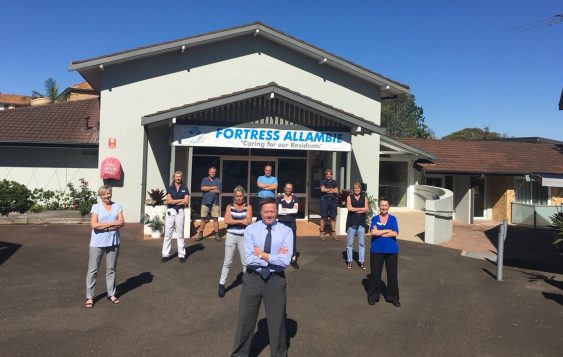Prime Minister Scott Morrison has issued a “strong reminder” against shutting off elderly residents from their families or keeping them in their rooms, following a meeting of the National Cabinet on Tuesday.
“There is great concern that the isolation of elderly people in residential care facilities where they have been prevented from having any visitors,” he said.
“[It] is not good for their wellbeing, [it]is not good for their health.”
But there is no wellbeing without health, a view being taken by a large number of aged care operators who are not complying with the Prime Minister’s request or the Government’s guidelines (pictured above is Allambie Heights Village Ltd. on Sydney’s Northern Beaches which closed its doors to non-essential visitors on 31 March after a staged process to allow residents and families to adapt to the separation).
All residents and staff are the responsibility of the operator
There are a number of reasons the operators are not complying with the Prime Minister.
Aged care homes in many other countries are the epicentre of deaths from infection. The risks have been verified here in Australia, with the worst outbreaks aside from the Ruby Princess cruise ship being in very well managed aged care homes operators by large Not For Profit organisations, BaptistCare and Anglicare.
Simply put, the virus entering an aged care home is highly likely to results in deaths.
It is not only residents that get infected, but staff as well. The Anglicare home affected has over 50 staff out of 90 self–isolating, with 15 infected.
This has a huge impact on all residents as well.
Despite having a big staff network (well over 1,000 in Sydney each) to call upon, these operators still could not get a full staff roster two weeks after the first infection. The Government has promised a flying squad of staff to go in and support, but they have failed to arrive. In Sydney.
This shows staff are fearful of infection. And the operator has a responsibility to keep them safe – and their families – against the backdrop that no one can identify 100% of people who have the virus given up to 50% are asymptomatic for the first five days and more.
Allowing visitors into the aged care home is a huge risk to all.
“But my Mum is important”
It is totally understandable that families are concerned, incredibly concerned, about their mums and dads or husbands or wives.
But can the staff of an operator judge who should be more important to have as a visitor and risk all the other residents?
How does a staff member explain that your Mum is now infected and may die because they allowed another resident to have a family member visit? How does management explain to the staff that they will be put at risk?
This is the daily challenge on a very personal level for staff and the operator.
Respectful conversations
There are unique circumstances, such as end of life and palliative care, where respectful conversations are taking place every day, and conditions set up to allow visitations.
This is not new for staff and operators.
And remember, all residents will have become family for the staff as well.
Under the current Department of Health guidelines, residents can only have two visitors per day in their room for a short time. Operators are seeking visitors to be understanding that requests for visits be minimised to protect their family residents and the staff.
It is harsh, but so is the impact if COVID-19 enters an aged care home.
It takes a lot for the management of an aged care home to stand up to a Prime Minister, especially one who us doing such a great job, but they know their job, they know their responsibility, and they care for all their residents, and staff.




Discussion1 Comment
Isolation is particularly hard for residents who have dementia. Trying to explain why they cant go out or we cant come in is really difficult – gosh we find it hard to believe ourselves! Mum has paranoia and hides and then cant find stuff so believes it has been stolen – we used to find it for her – staff just dont have the time, so this causes further distress.
My parents are used to going out at least twice a week with my sister and I (separately), so they have had their wings clipped severely. Mum and dad have dementia but they are physically able, so being kept in is particularly hard to bear. For most of the residents it is no different to their normal day to day “life”, but for those who do have regular visits from family and “escape” whenever they can, 5 weeks is a long time. Mum can be in a terrible way when we arrive but the minute she gets in the car and I change the subject, she becomes the mum of old, and always goes back with a smile on her face.
We are willing to have temperatures taken on arrival, and would just take them in the car for a drive, and bring them back after an hour – is this a risk? My understanding is that all cases in homes have originated from staff not family.
We are very lucky that mum and dad have a window facing the outside, so we visit through the window, even celebrated dads birthday there, but it is not the same.